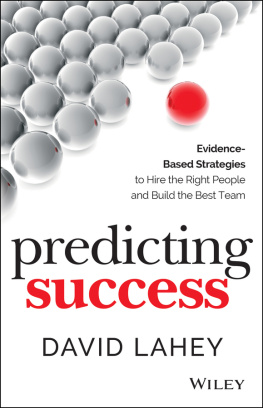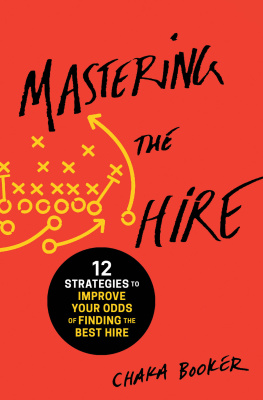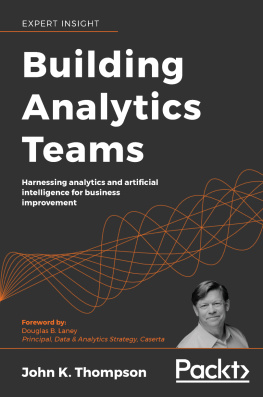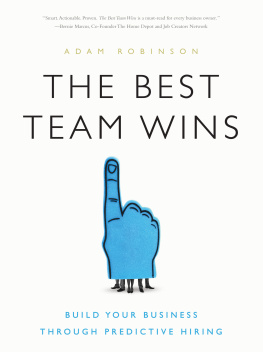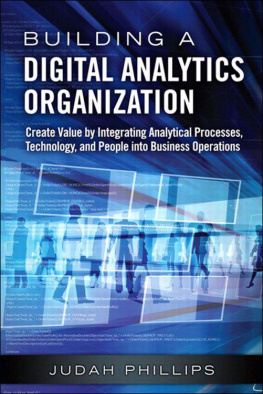
Praise for Predicting Success
Dave Lahey absolutely understands the human dynamics of today's global workplace. He knows what mobilizing and accelerating a workforce is all about in the global battle for talent. Dave's thought leadership on the implementation of workforce analytics is the primer for the power of acceleration for leaders at every level.
Mike Stewart, President and CEO, Predictive Group
Dave Lahey has had many years working in and with some of the most successful companies in the world. In his book Predicting Success, he brings a clear and insightful framework to understanding the many and sometimes contrary dynamics we face in our business from day to day. It is this clarity that sets Predicting Success apart and makes it a must read for all managers who are looking for practical and useful systems and methodologies to solve business problems.
Robin Wood, President, Predictive Advantage
This is an easy read that concisely summarizes the unquestionable need for hiring tools in the success of any business (large or small). The book gives ample examples of the power provided by understanding your employees' skills and characteristics. The Predictive Index behavioral assessment tools and training not only transformed the way I ran my laboratory but also changed the way I approached teaching and mentoring my students and trainees, with the added bonus of saving a lot of money. In the end, the book highlights how these types of tools, available through Predictive Index, are really just a very efficient and cost-effective way of implementing common sense in projecting, planning, and executing management decisions.
Peter Backx, DVM, PhD, Professor, University of Toronto, School of Medicine
David Lahey's book, Predicting Success, is excellent at helping leaders learn and grow. With his incredible knowledge and experience in business, Dave has this special talent to align challenges and people for higher achievements. It is not by chance that his company, Predictive Success, is definitely one of the most successful licensees in the PI Worldwide network.
Yves Djorno, PhD, Strategic Coach to Entrepreneurial Leaders
Cover image: Individuality Sphere iStock.com/fatido
Cover design: Wiley
Copyright 2015 by Predictive Success Corporation. All rights reserved.
www.predictivesuccess.com
Published by John Wiley & Sons, Inc., Hoboken, New Jersey.
Published simultaneously in Canada.
No part of this publication may be reproduced, stored in a retrieval system, or transmitted in any form or by any means, electronic, mechanical, photocopying, recording, scanning, or otherwise, except as permitted under Section 107 or 108 of the 1976 United States Copyright Act, without either the prior written permission of the Publisher, or authorization through payment of the appropriate per-copy fee to the Copyright Clearance Center, 222 Rosewood Drive, Danvers, MA 01923, (978) 750-8400, fax (978) 646-8600, or on the web at www.copyright.com. Requests to the Publisher for permission should be addressed to the Permissions Department, John Wiley & Sons, Inc., 111 River Street, Hoboken, NJ 07030, (201) 748-6011, fax (201) 748-6008, or online at www.wiley.com/go/permissions.
Limit of Liability/Disclaimer of Warranty: While the publisher and author have used their best efforts in preparing this book, they make no representations or warranties with respect to the accuracy or completeness of the contents of this book and specifically disclaim any implied warranties of merchantability or fitness for a particular purpose. No warranty may be created or extended by sales representatives or written sales materials. The advice and strategies contained herein may not be suitable for your situation. You should consult with a professional where appropriate. Neither the publisher nor the author shall be liable for damages arising herefrom.
For general information about our other products and services, please contact our Customer Care Department within the United States at (800) 762-2974, outside the United States at (317) 572-3993, or fax (317) 572-4002.
Wiley publishes in a variety of print and electronic formats and by print-on-demand. Some material included with standard print versions of this book may not be included in e-books or in print-on-demand. If this book refers to media such as a CD or DVD that is not included in the version you purchased, you may download this material at http://booksupport.wiley.com. For more information about Wiley products, visit www.wiley.com.
ISBN 978-1-118-98597-7 (cloth); ISBN 978-1-118-98599-1 (ebk); ISBN 978-1-118-98598-4 (ebk)
To Patty
Chapter 1
How to Start
PEOPLE. THEY ARE AT THE CORE OF everything a business does. How we work and communicate has been an area of study in North American corporate circles for decades. An avalanche of research describes an evolving global business landscape that will soon be populated by workers in jobs for which they are mismatched, workers who live with an entitled view and disconnected workers whose skills aren't properly taken advantage of. These workers then must labor under the direction of so-called leaders whose own managerial talents are lacking a fistful of essentialsincluding the small matter of understanding how to get the most out of their workforce. Oh, and this is against the backdrop of weakening international economies, widespread unemployment, and spiritually bankrupt political players. Yoga breath now.
This is good news. This is what opportunity looks like. This is a chance for the tough to get going and the wheat to start drawing up separation papers for the chaff. If everyone is thriving, after all, how can any single organization stand out from its competitors? It is from an environment of uncertainty and despair that the truly phenomenal emerge.
And better still, the trick to surfacing as the victor from such a challenging scene is a relatively straightforward one. Scientific in its proven application and even mathematical in its precision, employ it, and reverse your fortunes. Master it and never look back.
The Blame Game
Job one on this pursuit is to gain an appreciation for exactly what's wrong with the status quo. Sometimes, business leaders are broadly aware that things aren't working so well at the shop, that resources aren't being utilized to their full potential, or that the lofty ideals they harbor for their company's existence are not being met. However, they're unable to identify the particular source of their shortcomings so that they might effectively address them. As per the adage, if you don't know what's broken you cannot find the solution.
If you're among those still wondering where the problem lies, here's a hint. It's North America's greatest asset, complete with an ill-applied skillset and an underused productivity well. It's the average worker, and you might think he's just your mailroom supervisor or only your IT guy, but you'd be wrong. He's your entire company.
The Office Paradigm, Revised
Mercifully, long gone are the days when fat-cat corporate types would oversee a workforce whose participants inherently understood their role in what was. Looking back, it was a truly remarkable hierarchy. These were disquieting times. A pack of workers would toil their lives away, lining their boss's pocketsand nothing more. There was no sense that the individuals whose labors were earning money for the organization were anything but automatons, existing purely for the benefit of their employer. Their own personal objectives and quest for individual fulfillment were simply not factors. And the concept of work-life balance? Forget about it.
Next page
